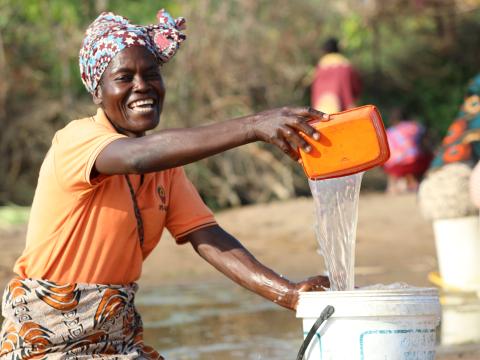Water Technology Brings Multiple Benefits and Improves Living Conditions in Mozambique

The northern part of Gaza Province, in Mozambique, is known for its semi-arid climate, characterised by scorching heat and parched soils. This is the reality in Mabalane District, where, despite being traversed along its entire length by the Limpopo River, communities continue to face the harsh challenge of accessing safe drinking water.
Interestingly, the water table lies very deep, making the installation of pumping or water supply systems difficult. And when such systems are possible, the costs are high, and the water is often brackish and improper for consumption.
For this reason, Saugineta and other community members have abandoned the only existing water supply system and instead choose to walk long distances to the river, facing numerous risks. A simple hand-dug hole in the sandy riverbed is often enough to access a spring, water that is not brackish and appears safe.
“The tap is close, but the water tastes bitter,” says Saugineta, brushing the sand from her hands. “From the riverbed, the water feels alive. It’s clear, cool, and soft, like a gift hidden beneath our feet. Even though it means walking far, we trust that water.”
However, this is not always the case. During the rainy season, no one dares approach the river, the currents fill the riverbed and sweep away everything in their path. At these times, families are forced to collect surface water, exposed to even greater dangers.
“It’s frightening,” admits Eulália, a 14-year-old who often misses school to fetch water for her family. “When the river rises, we stay away. You can see crocodiles waiting along the banks, and the water turns brown with debris. Still, we have no choice, our families depend on us.”
A Proven Water Technology is Introduced
It was with the lives of these two generations, and those yet to come, in mind that World Vision Mozambique intend to implementing a pioneering technology: sand abstraction, or water extraction through river sand. Even when the river appears dry and the bed turns to hot sand, life hides beneath the surface.
Unlike rudimentary practices where people dig by hand for small amounts of water, the World Vision WASH team uses this technology to extract clean water from deeper layers of sand, where it is naturally stored and filtered. The sand acts as a natural barrier, trapping sediment and impurities, providing safer water for human consumption.
Through a subterranean filter and a solar-powered pumping system, water will be conveyed to a reservoir and then distributed to community points. The impact is immediate: families no longer need to walk long distances or share the same sources with animals.
“This will change everything,” says Repsino Tivane, WASH Technician at World Vision Mozambique, his face breaking into a smile. “No more walking miles under the sun, no more sharing water with livestock. Families will have clean water at home, enough to drink, to cook, and even to make their fields green again.”
Multiple Benefits Beyond Water For Domestic Use
Due to agro-ecological conditions and the effects of the El Niño phenomenon, Mabalane District has faced severe droughts, leading to food shortages. The expectation is that this system, installed at three strategic points, will support field irrigation and strengthen food security for families.
“What makes this solution truly special,” Repsino adds, “is that it’s simple, affordable, and sustainable. Even when the rivers dry up, the pumps will keep running, powered by the sun, delivering water every single day. It’s hope, drawn straight from the sand.”
With the support of this simple yet ingenious technology, communities in Mabalane will gain access to one of life’s most essential resources, water, with dignity, safety, and hope.
World Vision Mozambique remains committed to promoting sustainable access to safe drinking water, sanitation, and hygiene, particularly in areas most affected by drought and climate change. Through innovative solutions such as this, the organisation reaffirms its mission to improve the health, resilience, and well-being of children and their communities.
This marks the first implementation of sand abstraction technology in Mozambique.